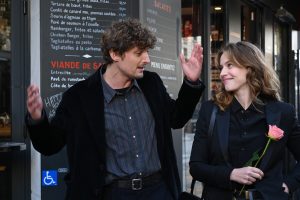
It would be tempting, in the current media narrative of Woody Allen’s now-tarnished career in the United States, to view his first foreign-language film as a necessary retreat. After all, the story goes, the guy can only shoot overseas because no American actors will agree to work with him anymore. Allen’s cancellation is regional, not global.
Maybe there is some truth to this; many actors who had been a part of his stable have publicly regretted it, or vowed to never act in one of his movies again. But remember that since the turn of the century, Allen has shot nine films in Western Europe, whose most idyllic locales have served as much a muse to the filmmaker as the stories and actors they contain. In the broader arc of his globetrotting oeuvre, and in our good-faith endeavors to separate the art from the artist, his latest feature Coup de Chance (MPI, $20.99 Blu-ray, $17.19 DVD) feels like a hand he pursued, not a hand he’d been dealt.
At any rate, the mere presence of subtitles is an instantaneous and welcome change for a writer whose most recent features have felt fusty and stilted in their use of language. At least in translated French, Coup de Chance is one of Allen’s best-written movies of the century, flowing with a seemingly effortless sense of naturalism.
The film starts with a chance encounter (its title in English is Stroke of Luck) between Fanny Fournier (Lou de Laâge), a married Parisian who works in a prestigious auction gallery, and Alain Aubert (Niels Schneider), a peripatetic novelist who harbored a debilitating crush on Fanny in high school, and who isn’t bashful about revealing his affections all these years later. Fanny agrees to meet Alain for lunch one day, which becomes a daily tradition of lingering afternoons in the park, catching up on old times and their current, disparate lives. Then she lets Alain cook for her in his bohemian loft, and one things leads to another.
Fanny never believed herself capable of an affair, but Alain reminds Fanny of her youth, as a rebel whose first marriage, to a drug-addicted musician, led her into the arms of a partner who couldn’t be more divergent: her current husband Jean (Melvil Poupaud), a shadowy and controlling businessman who moves money around for what we delicately call high-net-worth individuals. One character describes Jean as “Gatsby-esque,” and he operates in a social set of extravagant wealth — typical discussions turn to memories such as consuming suckled pig on St. Maarten, and that eternal lament of the well-heeled, “it’s so hard to find good help” — of which Fanny has never felt at ease. There are rumors that underneath Jean’s perfect hair and pearly smile and crisp tailored suits, he has the ability to make someone disappear if they become an inconvenient presence in his life. But surely this is just gossip, right?
For a workhorse filmmaker long accustomed to shooting a movie a year, Coup de Chance arrived in 2023 after a rare three-year lull, for perhaps obvious reasons (scandal, and the accompanying vagaries of financing), and because Allen published two books during this period. Whether it was the extra time afforded in the process or the inviting Parisian air, there’s an extra spring in the filmmaker’s step this time. He seems immediately intoxicated by his characters, circling them in sprawling and elegant single takes, and we grow smitten along with him.
There’s nothing revolutionary in a narrative about an adulterous affair, a jealous husband and a criminal cover-up, but its very Frenchness places Coup de Chance on a continuum of Parisian morality fables that stretches back to the Nouvelle Vague. It’s easy to image Allen devouring a bunch of Eric Rohmer and Claude Chabrol films, and setting out to shoot his own homage to them. As Coup de Chance progresses, the movie grows icier, more in line with the murder mysteries of the latter than the romantic rendezvous of the former. In Allen’s own filmography, it’s closer to Match Point than Vicky Cristina Barcelona.
As is customary for a director who lives mostly in the PG-13 realm, the film’s violent actions are implied, not shown. Allen doesn’t get his hands dirty with such nasty business; rare is the Allen budget with a line item for a fight choreographer.
And while there is humor, it’s more wry and ironic — indeed, concepts like irony and coincidence and serendipity undergird the machinations of its plot — than laugh-out-loud. Much of its acid wit arrives in the unusually prominent and recurring jazz selections that form a collective leitmotif across the action, namely Herbie Hancock’s “Cantaloupe Island,” Nat Adderley’s “Fortune’s Child” and Milt Jackson’s “Bags’ Groove,” whose mellifluous runs of vibraphone offer a delicious, cosmic juxtaposition to the increasingly mordant goings-on. (It’s also nice to see Allen evolving beyond his usual domain of Dixieland and bebop into the 1960s Blue Note era.)
Coup de Chance is certainly set in an insulated, cosmopolitan bubble familiar to Allen’s onscreen worlds, but he exhibits such élan in puncturing it that you’ll be eager to join him.